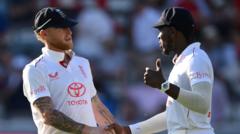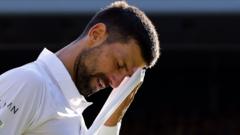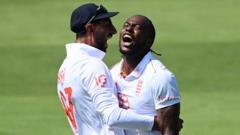Why Did Carlos Alcaraz's Wimbledon Semi-Final Against Taylor Fritz Need Rufus?

Wimbledon’s Feathered Friend: The Story of Rufus the Hawk
Every summer, the prestigious Wimbledon Championships draw thousands of tennis fans to the iconic grass courts, where sportsmanship and tradition reign supreme. However, amidst the thrilling matches and intense rivalries, a unique character has captured the hearts of many: Rufus, the hawk. Known for his role in keeping the courts free from pesky pigeons and other birds, Rufus has become a beloved fixture at Wimbledon. Recently, his absence was noted during an amusing incident involving a bird on the net during the semi-final clash between Carlos Alcaraz and Taylor Fritz. This incident not only highlighted Rufus’s importance but also raised questions about his future.
The Incident That Stopped Play
During the intense semi-final match between Alcaraz and Fritz, play was briefly halted when a bird decided to perch itself on the net. As Fritz prepared to serve with the score at 15-15, laughter erupted from the crowd, and even Fritz himself couldn’t help but smile at the unexpected interruption. Commentary from Andrew Castle added a humorous touch as he remarked, “There’s a bird on the net – and that’s the wrong place to be when Taylor’s about to serve!”
Amidst the laughter, tennis legend Andre Agassi chimed in, calling for Rufus to step in and handle the situation. “Where’s Rufus? We need Rufus to come and take care of that thing!” he exclaimed. The light-hearted moment underscored Rufus’s critical role in maintaining the decorum of the matches. It also sparked conversations about the hawk’s future, especially in light of recent breeding challenges.
The Role of Rufus at Wimbledon
Since 2008, Rufus has been the guardian of Wimbledon, flying over the courts to deter other birds from causing distractions during matches. His handler, Donna Davis, has devoted years to training him and ensuring he remains a crucial part of the Wimbledon experience. Rufus is an American Harris hawk, a species known for its intelligence and social behavior, making them ideal for such tasks.
Rufus’s duties include:
- Bird Control: His primary role is to keep the courts clear of other birds that might disrupt play.
- Public Engagement: Spectators often find great joy in seeing Rufus fly, adding a unique charm to the Wimbledon atmosphere.
- Environmental Aspect: Utilizing a hawk for pest control is a natural and environmentally friendly method, aligning with modern ecological practices.
A Succession Crisis?
Despite Rufus’s success, there are growing concerns about a potential “succession crisis.” At 17 years old, Rufus is in the latter part of his life expectancy, as Harris hawks typically live for 25-35 years. Recently, discussions have arisen about breeding Rufus to ensure the continuation of this tradition. However, attempts to mate him with a female hawk named Pamela did not go as planned. As Davis explained, “It was not love at first sight.”
The unsuccessful mating prompted Davis to consider alternative options. “I haven’t looked, but if there are any females that are not his bloodline then yeah we could try, couldn’t we?” she stated, hinting at the possibility of finding a suitable mate.
The Importance of Rufus Beyond the Courts
Rufus is not just a bird performing a job; he represents a deeper connection between nature and sport. His presence at Wimbledon exemplifies a commitment to preserving the environment while also enhancing the spectator experience. The utilization of a hawk for pest control demonstrates a unique blend of tradition and modern ecological awareness.
Why Rufus Matters
Understanding the significance of Rufus goes beyond his role as a pest controller:
- Symbol of Tradition: Rufus has become a symbol of Wimbledon’s commitment to tradition, reminding us that sports and nature can coexist harmoniously.
- Educational Aspect: His presence allows for educational opportunities, teaching audiences about birds of prey and their ecological roles.
- Community Engagement: Rufus connects the community, as fans share stories and experiences involving the hawk, enhancing the Wimbledon tradition.
Looking Ahead: Rufus’s Legacy
As Rufus ages, the question of his eventual successor continues to loom. While he has been a stalwart protector of the courts, the success of breeding efforts will determine whether future generations will enjoy the same spectacle. The potential for finding a mate is not just about continuing a job; it’s about preserving a unique aspect of Wimbledon’s identity.
With each passing year, Rufus has endeared himself to fans and players alike. His absence during the recent bird incident highlighted just how much he is missed when he is not present. It also served as a reminder of the lighthearted moments that can occur in the world of competitive sports, where even the most serious matches can be interrupted by a feathered friend.
The Future of Bird Control at Wimbledon
As discussions about Rufus’s breeding continue, the future of bird control at Wimbledon remains uncertain. If breeding efforts are successful, a new hawk could take over his duties and continue the legacy of pest control at the iconic venue. However, if these efforts do not yield results, Wimbledon may need to look for alternative solutions to maintain its pest-free environment.
Potential alternatives could include:
- Training Another Hawk: Identifying and training another hawk to take Rufus’s place could be a viable option, allowing for a smooth transition.
- Utilizing Technology: Employing drones or other technological solutions to deter birds might be considered if natural methods are not feasible.
- Community Involvement: Engaging local wildlife experts and enthusiasts could help find innovative solutions to bird control while preserving the charm of Wimbledon.
Final Thoughts: The Impact of Rufus
Rufus has become a beloved icon at Wimbledon, representing not just the fight against unwanted birds but also the blending of sport and nature. His story is a reminder of the unexpected moments that can arise in competitive sports, bringing joy and laughter to fans and players alike. As we look to the future, the legacy of Rufus will undoubtedly impact how Wimbledon approaches bird control, ensuring that this unique aspect of the tournament continues for years to come.
As we cherish Rufus and his contributions, it’s vital to remember the importance of environmental stewardship in sports. The continuing dialogue about his breeding and potential successors will shape the future of this tradition. Will Rufus’s legacy inspire new hawks to take flight at Wimbledon, or will the iconic courts face a new challenge in bird control? Only time will tell.
FAQs
What is the role of Rufus at Wimbledon?
Rufus is a hawk trained to keep the courts free of other birds that might disrupt play, ensuring a smooth experience for players and fans alike.
Why was play halted during the Alcaraz vs. Fritz match?
A bird landed on the net during the match, prompting a brief pause in play as players and spectators enjoyed the unexpected moment.
What challenges has Rufus faced in breeding?
Attempts to breed Rufus with a female hawk named Pamela were unsuccessful, raising concerns about his future and the need for a successor.
As we continue to enjoy the splendid traditions of Wimbledon, how do you feel about the role of wildlife in sports? Should we embrace more natural solutions like Rufus, or explore new methods? #Wimbledon #RufusTheHawk #TennisTraditions
Published: 2025-07-11 13:29:49 | Category: Sport



